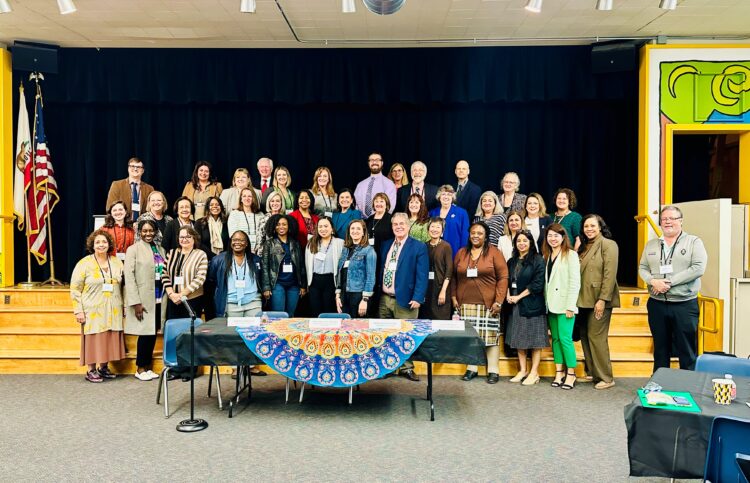NASBE, NCSL Hold Convening on Early Literacy and Math in San Diego
Alexandria, VA – On October 24-25, 2023, state board of education members from the National Association of State Boards of Education’s (NASBE’s) Early Literacy Work Group joined state legislators from across the U.S. to collaborate and discuss the latest research and state activities surrounding early literacy and math policymaking. State board members are often charged to make policy changes for early literacy and math by state legislatures, so bringing these two groups together is crucial to advancing effective educational systems for young learners.
This two-day event, cohosted by NASBE and the National Conference of State Legislatures (NCSL), took place in San Diego, immediately preceding NASBE’s 2023 Annual Conference. Participants joined from Arizona, Colorado, Delaware, the District of Columbia, Georgia, Guam, Hawaii, Illinois, Maryland, Massachusetts, Michigan, Montana, Nebraska, Nevada, New York, North Carolina, and Oregon.
The day was jam-packed with engaging networking and learning opportunities including a presentation by ExcelinEd’s Casey Sullivan Taylor on literacy policies and science of reading; a state-led panel on ways state board members and legislators can collaborate to improve early literacy and math outcomes; a look at math education practices and policies by Stanford University’s Dr. Deborah Stipek; a discussion on state strategy implementation by education agency staff; and a demonstration on innovative, play-based approaches to engage kids in math, such as the Minnesota State Fair’s Math On-A-Stick! program.
“I am so grateful to have the opportunity to discuss literacy reform and the work that’s been done over the past decade,” said Colorado State Senator Janice Marchman. “Our conversations regarding buy-in were particularly meaningful to me, and I walked away from this convening knowing in order to make targeted achievement improvements in literacy and math, we have to bring educators, families, and students together to align our goals and values.”
Attendees also visited Florence Elementary School in San Diego Unified School District, where they toured classrooms and learned about the implementation of California’s universal transitional kindergarten (UTK) program. While observing UTK and kindergarten classrooms, attendees were able to get an in-depth look at reading lessons, interactive learning activities, and play-based math, a common theme from the previous day’s sessions.

Following the tour, a panel of educators and administrators, including four of the UTK teachers, showcased the work that went into implementing the UTK program and its impact on the community. Questions from participants focused on longitudinal data to track UTK students’ future success, the impact UTK has had on the early childhood ecosystem, and how states can support implementation of similar programs.
“It was so exciting to feel the positive energy throughout the visit at Florence Elementary School,” said Chuen-Chin Chang, member of the Maryland State Board of Education. “More impressive [was how] the local government and school system leadership created this unique UTK track to support the community by hearing their needs.”
“We remind state board members all the time how valuable convening key stakeholders can be toward advancing policy. After a year of learning opportunities and collaboration among state board members and policy experts in the Early Literacy Work Group, we found that bringing these state leaders together led to a lively, productive exchange of ideas and innovative strategies around early literacy and math,” said Winona Hao, NASBE’s director of early learning. “We saw a strong desire among this group to continue these conversations and convene again.”
“By bringing together education board members and legislators, we were able to highlight successful collaborative efforts, talk openly about the challenges in enacting statewide policy change, and provide time to think deeply about the collaboration our members want to foster when they return home,” said Patrick Lyons, senior policy specialist at NCSL. “I think everyone left this meeting with a better understanding of how to successfully connect policymaking and implementation.”
NASBE serves as the only membership organization for state boards of education. A nonpartisan, nonprofit organization, NASBE elevates state board members’ voices in national and state policymaking, facilitates the exchange of informed ideas, and supports members in advancing equity and excellence in public education for students of all races, genders, and circumstances. Learn more at www.nasbe.org.
###
Related Content
-
State Policy to Support Early Literacy Success
After recent NAEP scores highlighted low reading proficiency among students in the U.S., many states are looking to science of reading and evidence-based literacy instruction to bolster their state policies to better prepare young children on how to read. State boards of education have the opportunity to ask questions and support policies that ensure all […]
-
Stepping Up for Early Childhood Education
The impact of early childhood education is undeniable. Yet access to high-quality early education across the country remains uneven, and many children still enter elementary school unprepared.

 i
i
 i
i
 i
i